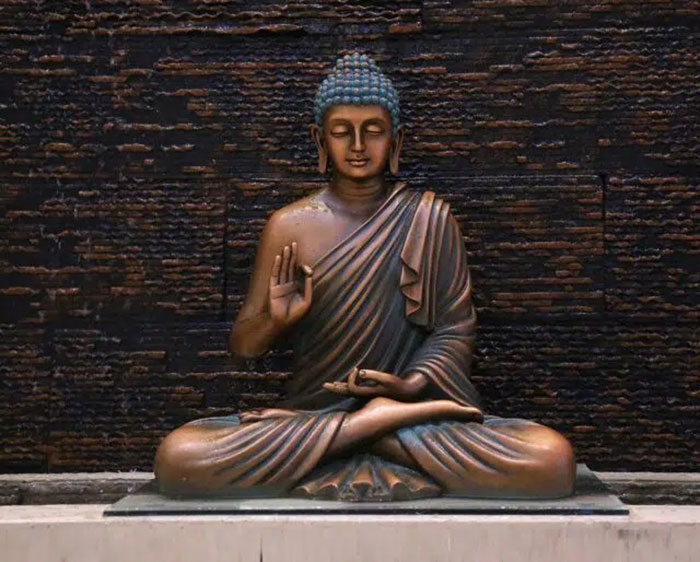Features
Muditha (sympathetic joy) in Buddhism

Greed is a burning desire, unquenchable thirst, a craving and lust. People who are greedy want the objects of their desire to provide them with lasting satisfaction so they feel fulfilled, whole, and complete. Greed creates an inner hunger so that that they always seem to be striving towards an unattainable goal. They mistakenly believe their happiness is dependent upon that goal, but once they attain it they get no lasting satisfaction. Greed is all encompassing as it includes defilements relating to money, yearning lust and food and the inability to let go of things easily, and our desire to have more than others.
By Dr. Justice Chandradasa Nanayakkara
There are four sterling qualities or attitudes, which are collectively called in Pali as Brahma-Viharas in Buddhism. They are (a) Loving-kindness or universal love (Metta) (b) Compassion (Karuna) (c) Sympathetic joy or appreciative joy (Muditha) (d) Equanimity (Upekka). Brahma Viharas as positive virtues can also be taken as subjects of meditation.
The word Brahma has been interpreted to mean excellent, lofty, sublime or noble, and Vihara as states of living. Brahma Vihara, therefore, means sublime states and some call it divine states, or divine abodes. These four attitudes are said to be excellent, or sublime, because they are the right, or ideal, way of conduct to be directed towards all living beings. They provide the answer to all situations, arising from social contact, and is the most conducive to noble living. They level social barriers, build harmonious communities, promote altruism, unity and brotherhood.
The four states of mind; love, compassion, sympathetic joy and equanimity are also known as the boundless states (appamannyo) as they are virtues extended to all beings, without exception, regardless of their caste, race, colour and creed, and is not narrowed by any limitations as to the range of beings towards whom they are extended to. In other words, they are nonexclusive and impartial and is not bound by selective preferences or prejudices. A mind that has reached that state of boundlessness will not harbour any national, racial, religious or class hatred. One, who assiduously cultivates these four positive attitudes, by conduct and meditation, is said to become an equal of Brahma. These
divine states assist mankind to overcome their negative emotions, such as anger, fear and delusion. Further, when these positive qualities become the dominant influence in a person’s mind it is said he will be reborn in a congenial world, after his death. The four sublime states are interrelated and interdependent.
Mudita is the third sublime virtue. Mudita is usually translated as “sympathetic” joy or “altruistic” or vicarious joy, which is the pleasure that comes from delighting in another person’s wellbeing. Hence, mudita, as a subject of mediation, is used to cultivate appreciative joy at the success and good fortune of others.
Lord Buddha declared “Here, Monks, a disciple dwells pervading one direction with his hearts filled with sympathetic joy, likewise the second, the third and the fourth direction; so above, below and around; he dwells pervading the entire would everywhere and equally with his heart filled with sympathetic joy, abundant, grown great, measureless, free from enmity and fee from distress” (Deega Nikaya).
Mudita is traditionally regarded as the most difficult of the four immeasurables (Braham Vihara, or four sublime attitudes).to cultivate. It can mean to exult in happiness and achievements of others, even when we are facing tragedy ourselves.Not only is practicing Mudita beneficial to our individual wellbeing, it is also beneficial for the entire society. There are many “enemies” of Mudita which are mental tendencies that make it very difficult to practice Mudita. The primary obstacles are envy and greed.
Envy can be described as a negative emotional state in the face of another’s fortune. It is our inability to be happy for someone else’s good fortune. Mudita is the opposite of envy. Known as the green-eyed monster, envy, is made up of feelings of pain when we notice the possessions, good qualities or achievements of others. They seem painful to us, because they remind us too strongly of our own deficiencies as we see them we wish we had those things ourselves, so it is a form of craving. It is an emotion and one that, according to philosopher Bertrand Russell, is among the most potent causes of unhappiness.
When envy is present, we cannot endure others happiness. Very often some cannot bear to see, or hear, the successful achievements of others. They rejoice over their failures but cannot tolerate their successes. Instead of praising and congratulating the successful, they try to ruin, condemn and vilify them. In a way, Mudita contributes more to the happiness of the person who practices it than to others to whom it is extended to as it tends to eradicate jealousy, within the person who practices it.
Jealous behaviour can be very destructive, within a relationship. If left unchecked, jealously can lead to distrust, controlling behaviour and emotional, or physical, abuse. No one will admit being jealous, but every worlding has felt it at some point in life. Genuine joy in the prosperity and achievements of others is a rare quality. The virtue of Mudita is generally seen in the context of close relationships, such as parents and children, teachers and pupils. Parents generally feel joy over the success of their children, without any form of jealousy. So, do teachers in the successes of their pupils. Therefore, it may be an easy virtue to practice, within the narrow circles of one’s family. To practice the same virtue towards extended social circles, and society, at large, may require a tremendous amount of effort and will power. Sometimes, rivalry and jealousy can be seen even among siblings. Undeniably, jealousy is an emotion that is embedded in human nature.
When something good happens to someone on the surface, one may feel happy for him. But, internally, there can be a twinge of jealousy. This is the common human response.Greed is a burning desire, unquenchable thirst, a craving and lust. People, who are greedy, want the objects of their desire to provide them with lasting satisfaction so they feel fulfilled, whole, and complete. Greed creates an inner hunger so that they always seem to be striving towards an unattainable goal. They mistakenly believe their happiness is dependent upon that goal, but once they attain it they get no lasting satisfaction. Greed is all encompassing as it includes defilements relating to money, yearning lust and food and the inability to let go of things easily, and our desire to have more than others.
Methodical meditative practice of Mudita will help love, compassion, joy and equanimity, to become spontaneous. It will make the mind firmer, collected and calmer, despite the numerous irritations and problems in life. Practical conduct governed by sublime states, (Mudita) will harbour less resentment, tension and irritability.
Features
Kashmir terror attack underscores need for South Asian stability and amity

 The most urgent need for the South Asian region right now, in the wake of the cold-blooded killing by gunmen of nearly 30 local tourists in Indian-administered Kashmir two days back, is the initiation of measures that could ensure regional stability and peace. The state actors that matter most in this situation are India and Pakistan and it would be in the best interests of the region for both countries to stringently refrain from succumbing to knee-jerk reactions in the face of any perceived provocations arising from the bloodshed.
The most urgent need for the South Asian region right now, in the wake of the cold-blooded killing by gunmen of nearly 30 local tourists in Indian-administered Kashmir two days back, is the initiation of measures that could ensure regional stability and peace. The state actors that matter most in this situation are India and Pakistan and it would be in the best interests of the region for both countries to stringently refrain from succumbing to knee-jerk reactions in the face of any perceived provocations arising from the bloodshed.
The consequences for the countries concerned and the region could be grave if the terror incident leads to stepped-up friction and hostility between India and Pakistan. Some hardline elements in India, for instance, are on record in the international media as calling on the Indian state to initiate tough military action against Pakistan for the Kashmiri terror in question and a positive response to such urgings could even lead to a new India-Pakistan war.
Those wishing South Asia well are likely to advocate maximum restraint by both states and call for negotiations by them to avert any military stand-offs and conflicts that could prove counter-productive for all quarters concerned. This columnist lends his pen to such advocacy.
Right now in Sri Lanka, nationalistic elements in the country’s South in particular are splitting hairs over an MoU relating to security cooperation Sri Lanka has signed with India. Essentially, the main line of speculation among these sections is that Sri Lanka is coming under the suzerainty of India, so to speak, in the security sphere and would be under its dictates in the handling of its security interests. In the process, these nationalistic sections are giving fresh life to the deep-seated anti-India phobia among sections of the Sri Lankan public. The eventual result will be heightened, irrational hostility towards India among vulnerable, unenlightened Sri Lankans.
Nothing new will be said if the point is made that such irrational fears with respect to India are particularly marked among India’s smaller neighbouring states and their publics. Needless to say, collective fears of this kind only lead to perpetually strained relations between India and her neighbours, resulting in regional disunity, which, of course would not be in South Asia’s best interests.
SAARC is seen as ‘dead’ by some sections in South Asia and its present dysfunctional nature seems to give credence to this belief. Continued friction between India and Pakistan is seen as playing a major role in such inner paralysis and this is, no doubt, the main causative factor in SARRC’s current seeming ineffectiveness.
However, the widespread anti-India phobia referred to needs to be factored in as playing a role in SAARC’s lack of dynamism and ‘life’ as well. If democratic governments go some distance in exorcising such anti-Indianism from their people’s psyches, some progress could be made in restoring SAARC to ‘life’ and the latter could then play a constructive role in defusing India-Pakistan tensions.
It does not follow that if SAARC was ‘alive and well’, security related incidents of the kind that were witnessed in India-administered Kashmir recently would not occur. This is far from being the case, but if SAARC was fully operational, the states concerned would be in possession of the means and channels of resolving the issues that flow from such crises with greater amicability and mutual accommodation.
Accordingly, the South Asian Eight would be acting in their interests by seeking to restore SAARC back to ‘life’. An essential task in this process is the elimination of mutual fear and suspicion among the Eight and the states concerned need to do all that they could to eliminate any fixations and phobias that the countries have in relation to each other.
It does not follow from the foregoing that the SAARC Eight should not broad base their relations and pull back from fostering beneficial ties with extra-regional countries and groupings that have a bearing on their best interests. On the contrary, each SAARC country’s ties need to be wide-ranging and based on the principle that each such state would be a friend to all countries and an enemy of none as long as the latter are well-meaning.
The foregoing sharp focus on SAARC and its fortunes is necessitated by the consideration that the developmental issues in particular facing the region are best resolved by the region itself on the basis of its multiple material and intellectual resources. The grouping should not only be revived but a revisit should also be made to its past programs; particularly those which related to intra-regional conflict resolution. Thus, talking to each other under a new visionary commitment to SAARC collective wellbeing is crucially needed.
On the question of ties with India, it should be perceived by the latter’s smaller neighbours that there is no getting away from the need to foster increasingly closer relations with India, today a number one global power.
This should not amount to these smaller neighbours surrendering their rights and sovereignty to India. Far from it. On the contrary these smaller states should seek to craft mutually beneficial ties with India. It is a question of these small states following a truly Non-aligned foreign policy and using their best diplomatic and political skills to structure their ties with India in a way that would be mutually beneficial. It is up to these neighbours to cultivate the skills needed to meet these major challenges.
Going ahead, it will be in South Asia’s best interests to get SAARC back on its feet once again. If this aim is pursued with visionary zeal and if SAARC amity is sealed once and for all intra-regional friction and enmities could be put to rest. What smaller states should avoid scrupulously is the pitting of extra-regional powers against India and Pakistan in their squabbles with either of the latter. This practice has been pivotal in bringing strife and contention into South Asia and in dividing the region against itself.
Accordingly, the principal challenge facing South Asia is to be imbued once again with the SAARC spirit. The latter spirit’s healing powers need to be made real and enduring. Thus will we have a region truly united in brotherhood and peace.
Features
International schools …in action

 The British School in Colombo celebrated the 2025 Sinhala and Tamil New Year with the traditional rites and rituals and customs unique to the island nation, during a special Avurudu Assembly held at the school premises.
The British School in Colombo celebrated the 2025 Sinhala and Tamil New Year with the traditional rites and rituals and customs unique to the island nation, during a special Avurudu Assembly held at the school premises.
Students from all over the world, who are part of The British School in Colombo, gathered to celebrate this joyous event.
The special assembly featured traditional song and dance items from talented performers of both the Junior and Senior Schools.
On this particular day, the teachers and students were invited to attend school in Sri Lankan national costume and, among the traditional rituals celebrated, was the boiling of the milk and the tradition of Ganu-Denu.

Boiling of
the milk
In the meanwhile, a group of swimmers from Lyceum International School, Wattala, visited Australia to participate in the Global-ISE International Swimming Training Programme in Melbourne.
Over the course of 10 days, the swimmers followed an advanced training schedule and attended sessions at the Melbourne Sports and Aquatic Centre (MSAC), Victoria’s Nunawading Swimming Club, and Camberwell Grammar School.
In addition to their training, the group also explored Melbourne, with visits to key landmarks, such as the Parliament House and the Melbourne Cricket Ground (MCG), along with city tours and cultural experiences.

Traditional dance item

Tug-of-war contest

On arrival in Melbourne, Lyceum International School, Wattala, with Sri Lankan officials
Features
Perfect … and healthy

 Got a few more beauty tips to give you … for a perfect complexion, or, let’s say, a healthy skin.
Got a few more beauty tips to give you … for a perfect complexion, or, let’s say, a healthy skin.
* Honey Face Mask:
Take a tablespoon of raw honey and then warm it up by rubbing it with your fingertips. Apply the warm honey all over your face. Let this natural mask stand for about 10 minutes and then wash it off gently with warm water.
* Coconut Milk Face Mask:
You need to squeeze coconut milk out of a grated raw coconut and apply this milk all over your face, including your lips.
(This will help you gain a glowing skin. It is one of the best natural tips for skin care)
* Orange, Lemon, and Yoghurt Moisturiser:
To prepare this moisturiser, you need a tablespoon of orange juice, a tablespoon of lemon juice and a cup of plain yoghurt.
Mix them together and apply the paste all over your face, leaving it as a mask for 10 to 15 minutes. Next, take a damp handkerchief and use it to clean your face.
(This moisturiser brightens the complexion of your skin)
* Cucumber and Lemon:
Apply equal parts of cucumber and lemon juice on your face before taking a bath. Allow it to sit for 10 minutes before rinsing it off. This natural face beauty tip will brighten your skin tone and lighten blemishes if used on a regular basis. The best aspect is that it is appropriate for all skin types!
* Healthy Diet:
Aside from the effective home remedies, there are certain other factors to consider for skin care – and the first of them is your diet. Without the right nutrients, your skin cannot reverse the damage it suffers every day.
Eat fruits that are high in vitamin C because they contain antioxidants.
Adjust your diet to get the right amount of protein and unsaturated fats, as well as fresh green vegetables. All of this provides the right amount of nutrients so your skin can heal and improve itself naturally.
* Sun Protection and Care:
Another thing to keep in mind is not to step out of your home without sunscreen, especially with this awful heat we are experiencing at the moment. The hard rays of the sun can do you more damage than you could ever imagine.
By the way, you can prepare your own sunscreen lotion with glycerin, cucumber juice and rose water. You can also keep this lotion in the fridge.
-

 Business5 days ago
Business5 days agoDIMO pioneers major fleet expansion with Tata SIGNA Prime Movers for ILM
-

 News4 days ago
News4 days agoFamily discovers rare species thought to be extinct for over a century in home garden
-

 Features6 days ago
Features6 days agoProf. Lal Tennekoon: An illustrious but utterly unpretentious and much -loved academic
-

 Foreign News5 days ago
Foreign News5 days agoChina races robots against humans in Beijing half marathon
-

 Features2 days ago
Features2 days agoRuGoesWild: Taking science into the wild — and into the hearts of Sri Lankans
-

 Editorial5 days ago
Editorial5 days agoSelective use of PTA
-

 News2 days ago
News2 days agoOrders under the provisions of the Prevention of Corruptions Act No. 9 of 2023 for concurrence of parliament
-

 Features4 days ago
Features4 days agoThe ironies of history
























